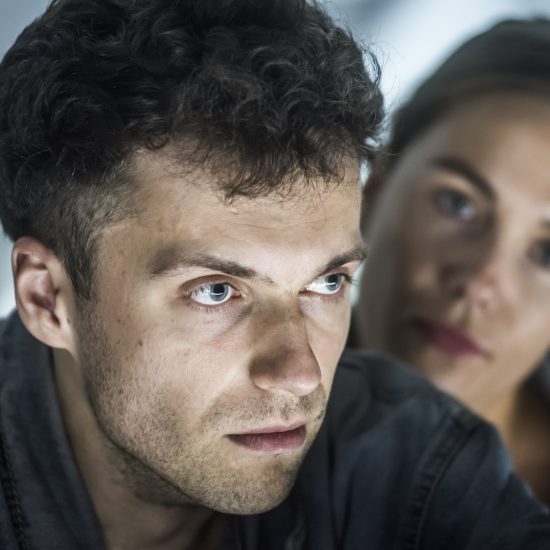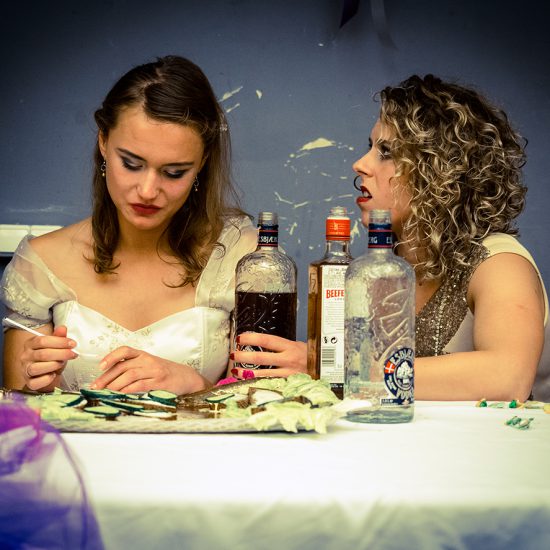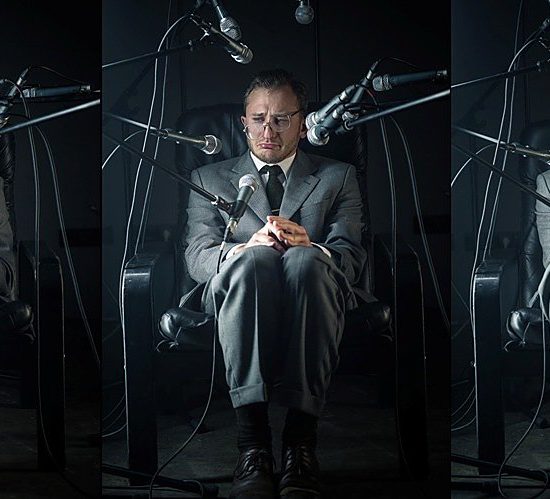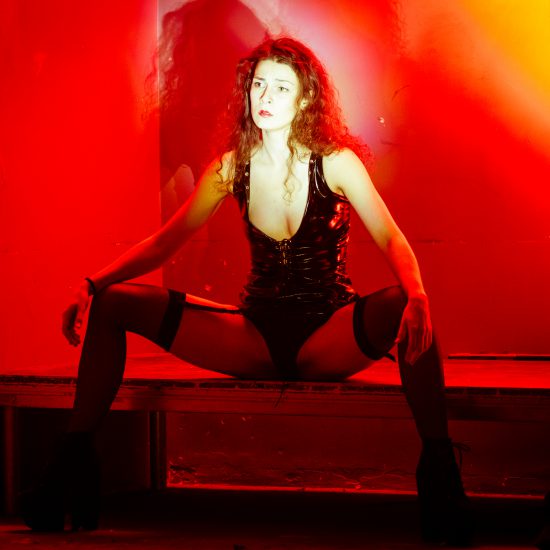I was Hamlet
<…> The show begins with a coded question: “Who are you?” The first ones to confront themselves are the brave nine actors, who sit with their backs turned to the audience looking at their make-up mirrors. Our Elsinore is a make-up room, which slowly turns into the Danish kingdom – Koršunovas has said once. Not just the kingdom. The director transforms the archetypal meanings and optical power of the mirror into the poetics of mystery, metaphysics of reflection, and existential horror. But, at the same time, he creates a network of associations, which engages (or not) the audience’s imagination and memory, which remembers (or not) Shakespeare’s words about theatre and mirrors, and is aware (or not) of the delicacy of the magical line between theater and life, as Life and Theatre are mirror images of each other.
Oskaras Koršunovas, together with costume designer Agnė Kuzmickaitė, has also created the set design of “Hamlet”. The variety of arrangements of mobile make-up tables on the stage creates a system of mirrors, which catches unexpected angles. Hamlet’s father’s ghost (actor Dainius Gavenonis) looks in the mirror and suddenly sees Claudius within himself. In this way, the director, turning to the biblical story of Cain and Abel, explains fratricide: Abel is bound to become Cain, because he wants to have what Cain took from him. Thus rotates the perpetual mechanism of murder. Gertrude (Nelė Savičenko) sees herself in the mirror without seeing: Where are your eyes? (III, IV). What will happen to her when, the mirrors turned at a certain angle, the truth floods her eyes? The fabulous Ophelia (Rasa Samuolytė) is drowned between the reflections of lies, and flowers. In this kingdom of mirrors, she has a special role – nobody is able to withstand a confrontation with her. The Ophelia scenes are among the most beautiful and saddest ones – the bouquets of flowers not only witness the actors’ triumph, but they also reveal the impermanence of the art of theater, symbolize untimely death, and turn the make-up room into a mortuary of identities. Polonius (Vaidotas Martinaitis), perfectly tuned into the role of a caring father, tries to ignore the reflections. Maybe it is due to this that he is punished as a victim of coincidence. Neat and settled life is not all we need to prepare our children for. Horatio (Julius Žalakevičius), who nimbly dives between the reflections and parallel worlds, is the only one to acquire the right to tell us what, how and why has happened. Yet, the director doesn’t trust him much: he prefers Goethe’s idea of a secret deal between Horatio and Fortinbras. <..>
Oskaras Koršunovas combines two possibilities of reading Shakespeare’s “Hamlet”: one is based on specific human experience, and the other – on the nature of theater. <..>
It is the double burden – the tangle of Hamlet’s ‘I’ and the models of Theatre – that highlights the loneliness of Darius Meškauskas’ character. Horatio is not the only one whom Hamlet does not trust. The ones with whom he might be having a good time are also susceptible to transformations, a certain disturbing instability, in this play. Rosencrantz (Tomas Žaibus) and Guildenstern (Giedrius Savickas) present themselves as playful transsexuals, indispensable characters in any elite bash. Does the discrepancy between the mental and biological human sex speak of possible treason (in this case – cooperation with Claudius)? However, at the end of the play they both appear as innocent twins dressed in sailor uniforms (a nice hint of the death of Rosenkrantz and Guildenstern on a ship bound for England). It is interesting that these Hamlet’s peers experience a Hamletian drama, though on a smaller scale: being different, the pressure of the authority, a disturbance when there is the need to choose, and death…
Hamlet (Darius Meškauskas) – who doesn’t really stand out at the beginning of the play, armed with bitter irony and a bottle of whiskey, gradually acquires such power of thought, that it is able to move the very foundation of the kingdom of Denmark, and becomes what, according to Koršunovas, Elsinore breaks into: after the “To be or not to be” monologue, Hamlet moves himself to the other side, a place of no return. The present time, what happens after he moves to the other side, turns into a dismal dream, and breaks through with heart and mind breaking monologues. This Hamlet is strong, but the increasing dependence on ceaseless thinking deforms him in a way. The soliloquy “To be or not to be” is said twice in the play.
Make-up tables, arranged in one line, divide the stage into two parts – one of them lit, and the other – plunged in darkness. Hamlet sits down on a make-up table, facing the audience. Darius Meškauskas says the soliloquy with self-condemnation – no metaphysical haze, intellectual contemplation, no self-deception. Hamlet simply considers suicide and what makes one stop for a second before moving to the unknown country, from which no traveler returns. The conclusion is clear: thinking makes us cowards (III, I). This Hamlet has a lot to consider and investigate, so, in the meantime, he chooses to be, but not with hope, because he’s only surrounded by despair. His determination resembles that of a scientist who wants to go to the end, even if this means his own destruction.
When the second half of the scene, behind the wall of mirrors, is illuminated, a monolithic group is highlighted: Polonius, Claudius, Gertrude, Horatio, and, in the front – Ophelia with a bouquet of white flowers. They have been listening to the monologue. The scene does not only remind us of something that is recorded in the plot of the drama, but is often overlooked, namely the fact that Claudius and Polonius heard the monologue “To be or not to be”, but also distinguishes the two worlds – Hamlet’s and that of the others, and, more importantly, it naturally extends the motif of theater: one of the most famous monologues in the theatre history is said by an actor, while his colleagues are standing backstage holding their breath, a bouquet prepared.
The famous monologue is repeated at the end of the play. The small space of the make-up room now does not seem as immaculately sterile as before. There are crumpled napkins on the floor, vases with flowers, the actors are sitting in front of their mirrors and wiping off their make-up, and only Horatio, made up as a clown, is still waiting for the final scene. Prior to that, there will be a duel between Hamlet and Laertes – ghastly, but, in terms of the strategy of the performance, logical and simple. Half-naked Darius Meškauskas and Darius Gumauskas will smear fake blood on their faces. The actors will go onstage, bleeding. But the duel has already begun – Hamlet and Laertes kill themselves, they shed blood with their own hands and share it; here they are their bodies touching as if saying the last goodbye. Hamlet approaches his Father who’s standing behind the mirrors. Another embrace – a long and strong one. And here he is, in front of us, on his knees, ready for the second and final trial – to be or not to be. The rugged Pyrrhus, he whose sable arms… – just recently the Prince, with a troupe of actors who came to Elsinore, tried to remember his favorite monologue, in which Aeneas tells Dido about himself. Now he is not unlike Pyrrhus, the son of Achilles, who avenges his father’s death, enraged, gored, his eyes ablaze. (II, II).
Darius Meškauskas does not spare himself when playing Hamlet, as though attempting to distil the most severe emotional and mental states, leading to a consistent self-destruction. His Hamlet isn’t a charismatic rebel, whom you’d fall in love with, neither is he an innocent victim of his time or even the hottest bachelor in Elsinore. This Hamlet is beyond the norm.
The actor, who keeps a particularly high note during the entire performance, has to finish it in an even higher pitch – he has to tell the monologue “To be or not to be” the second time so the audience feels Hamlet’s gained experience. What has he learned about man, the world and the mechanism? What has he learned by breaking that mechanism? …
She appears for the first time as a Japanese girl, gently singing Sakura. This is how Ophelia spends her time alone. Later, she stubbornly and patiently brings back the flower pot, which her brother Laertes constantly removes from Hamlet’s make-up table. This is Laertes’ way of warning Ophelia that the prince is not right for her. : Fear it, Ophelia, fear it, my dear sister (I, III). At the end of this scene they fight like children.
Ophelia trusts her father; she talks to Polonius of the most secret girly matters as openly as few daughters would. It is true that not every father would iron his daughter’s dress. Polonius (Vaidotas Martinaitis) is wearing a bathrobe and slippers. By mobile phone, he tells Reynaldo to keep an eye on Laertes and help him in France, which makes him a rather peculiar character in terms of Shakespearean images. What kind of counsellor is he? A family man absolutely dedicated to his children… In fact, he even dies for them. Martinaitis’ Polonius is more concerned about his children’s affairs than the Danish state. (This role shows that Vaidotas Martinaitis has strongly and consistently developed his acting skills.) <…>
Rasa Samuolytė’s Ophelia, though keeping the image of primordial innocence assigned to her by Shakespeare, is essentially heroic, idiosyncratic, mysterious, and bold. She goes through her own hell as if walking on the edge of a make-up mirror. At the end of the play she flounces about the space of the make-up room gasping for air, as if suffocating. Ophelia gives out white flowers and utters separate phrases of her almost surreal song. The actress unexpectedly reminds us of the awful fact that in Shakespeare’s tragedy Ophelia was buried at night due to the unclear cause of her death (an accident or a suicide?). The darkness of the night, surrounding Oskaras Koršunovas’ “Hamlet” easily overcomes daylight, the white color (Ophelia is wearing a white wedding dress, which emphasizes the innocence of the deceased bride, among white flowers). The light in this performance is artificial: it comes from the fluorescent lamps, mounted on top of the make-up mirrors. The white flowers are also artificial. There’s an obvious lack of air and natural light. In Shakespeare’s tragedy, before her death, Ophelia goes to the river and gathers flowers. To Oskaras Koršunovas’ Ophelia, locked in the theater’s make-up room, even this last moment of freedom – breathing fresh air – has not been granted. …
If the things I see are going on in Hamlet’s mind, then it is clear why actor Dainius Gavenonis has such a hard task: playing two roles – that of Hamlet’s father’s ghost and that of Claudius. Their images overlap in Hamlet’s mind. During his first meeting with the ghost, the Prince does not believe what he sees, and his childish exclamation “Pa!” reminds of the desolation of a son, who recognizes his father in the dead body lying in a morgue. Another important detail – both father and uncle epitomize masculinity to Hamlet. How imperious and strong was the gesture of the ghost that broke Hamlet! That feeling of sexual satisfaction, with which Claudius embraces Gertrude in the inauguration scene! If we say that Hamlet represents the generation that began to grow old even before it matured, then we may also say that Hamlet’s father and uncle belonged to the generation, symbolizing the stereotypes of men’s power. (Gertrude gets confused between Hamlet’s father and Claudius even before Hamlet does!)
Actor Dainius Gavenonis has few external effects to help him distinguish the Ghost from Claudius. An elegant black coat (the royal mantle) is for Claudius. It is enough to just slip it off and the actor turns into Hamlet’s half-naked father. At the end, he stands behind the mirrors with the coat on one shoulder: a centaurean image of Hamlet’s father and Claudius. These visual signals are meant for the audience, so they are unlikely to facilitate the actor’s task, which requires immense professional wisdom.
Gertrude’s (Nelė Savičenko) royally sophisticated and reserved personality fits this Claudius. The behavior of her adult son annoys her: what do you want from us? The director does not give the actress the opportunity to point up Gertrude’s decision to drink the poisoned wine, but the actress herself takes a few minutes time to show her solidarity with bewildered Ophelia. This can be perceived as both an empathic reaction of an older, more experienced actress to her younger colleague’s condition (she pours a glass of water in Ophelia’s face), and Gertrude’s belated female sympathy for Ophelia. Hamlet’s words “Frailty, thy name is woman!” (I, II) whipped both of them. He desperately tried to deny, annul the fact of his birth. The Prince didn’t see that both Gertrude and Ophelia’s hearts were crying with his tears.
Director Oskaras Koršunovas, for the first time in the Lithuanian history of productions of Hamlet, chose theatrical intimacy – here the Shakespearean space is compressed and confined in the make-up room. As the finale approaches, the actors seem to lack space, the re-composed lines of Shakespeare’s tragedy almost pile on one another, and Hamlet just won’t stop talking. It is too much for everybody – the actors as well as the audience. The atmosphere is stifling and Denmark, in this case, a theater make-up room, becomes a prison. Through Horatio, the director drops a few hints regarding the political motif of the tragedy, but the effect of prison is very strong, almost physically perceptible. This prison is in the mind.



